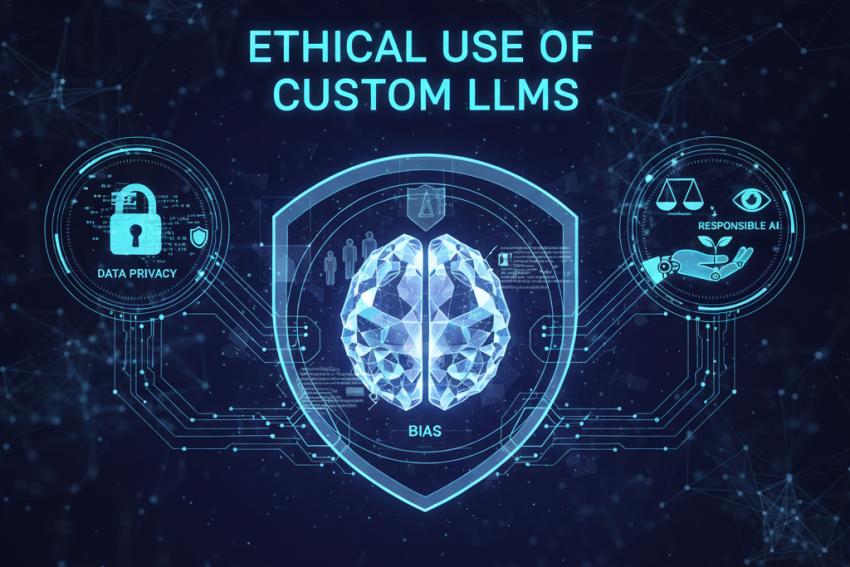
In a way, Large Language Models (LLMs) are changing the interaction patterns with technology. They assist companies in automated conversations and content and analysis of information quicker than ever before. But, with the increasing usage of custom LLMs, there is an increased responsibility to manage them. It is important to ensure that these models are used ethically to mitigate data privacy, lessen bias, and create a fair decision-making process by AI.
The question is how organizations may use custom LLMs in an ethical manner and establish trust in the era of intelligent automation.
Understanding Custom LLMs
A customized LLM is an AI trained on a set of data to be relevant to a company-customer support, research, content generation, etc. In contrast to the general-purpose models, the custom LLMs are trained on unique datasets of an organization and, therefore, are more precise and applicable to specialized tasks.
However, this customization has moral problems as well. The data that is being used to train these models may be sensitive or reflect their biases that are found in human choices. This is the reason why it is necessary to handle them responsibly at the initial stages.
1. Protecting Data Privacy
The ethical AI focuses on data privacy. Organizations tend to use customer data, employee data, or third-party data to train custom LLMs. Such knowledge should be treated by considering breaches or abuses.
These are some of the privacy practices:
Anonymize data: When using data to train, take out the personal information such as names, addresses or IDS before using them.
Optimize Secure Storage: Encrypt and tightly restrict access to datasets.
Adhere to legislation: Abide by laws like GDPR or HIPAA that such as define how data may be gathered and utilized.
Being open about the use of the data will facilitate the establishment of trust with users and clients.
2. Addressing Bias in AI Models
One of the ethical concerns in AI is bias. As LLMs model after existing data, there are times they will select biased trends--stereotyping or unjust associations. When they are not properly managed, these biases may influence hiring instruments, recommendation systems, or the interactions with customers.
To minimize bias:
Test many datasets: Have many datasets that represent various groups, viewpoints, and settings.
Periodically check outputs: Test the model results to detect biased or false results.
Add human supervision: Add AI with human opinion to make decisions fairly.
This methodology can enable AI to avoid the process of strengthening the social or existing cultural disparities.
3. Creating responsible AI Systems.
Responsible AI is not just about the data or algorithms, but it is also about the design, deployment, and maintenance of technology. Organizations must make sure that their bespoke LLM are ethical and are in line with human values.
Key principles include:
Transparency: Disclose the training of models and the use of data.
Responsibility: Deploy teams to control AI actions and solve the arising problems.
Sustainability: implement energy-saving educational approaches to minimize the environmental costs of massive models.
Responsible AI is not something that happens once but rather an ongoing procedure of review, feedback, and improvements.
4. Finding a Beam between Innovation and Ethics.
Ethics and innovation may be used together. Investigating the values of privacy, equity, and accountability, companies are able to create powerful and yet credible AI solutions. Ethical practices as well enhance confidence of the user and this is key to the long term success.
The value associated with AI systems is created when there is transparency and treatment of user rights in a responsible manner to all business, consumers, and the society at large.
As the third wave of digital technology, AI promises to substitute human experts in numerous roles, leading to the destruction of human jobs.
Conclusion: The Age of AI: Building Trust.
Our future with AI is reliant on our current levels of responsibility in the usage of AI. Custom LLAMs are vastly potentially productive and creative, yet they have to be constructed with ethics in mind.
We think responsible AI is not only about technology but also about trust at Tech.us. Organizational goals can be met by working on data privacy, bias minimization, and transparency to utilize the full potential of tailored LLMs, maintaining innovation as ethical, unbiased, and human-centered.




